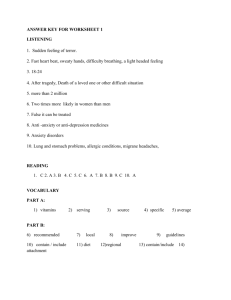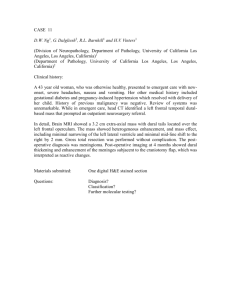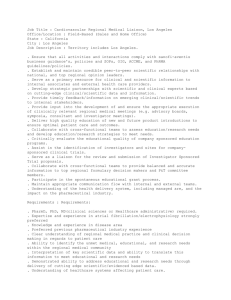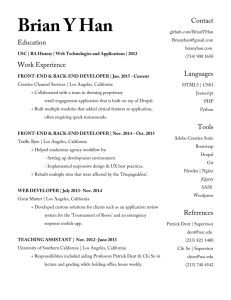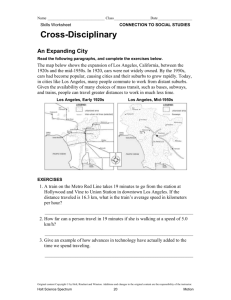Quality Improvement in USC Medical Center
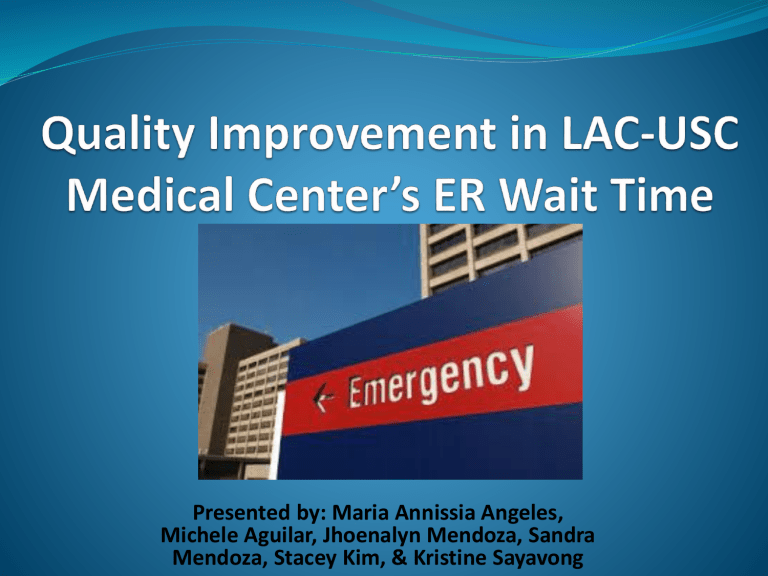
Presented by: Maria Annissia Angeles,
Michele Aguilar, Jhoenalyn Mendoza, Sandra
Mendoza, Stacey Kim, & Kristine Sayavong
Los Angeles County – USC Medical
Center (LAC-USC)
600-bed public teaching hospital located in the
Boyle Heights neighborhood of Los Angeles County of California
Jointly operated by Los Angeles County and the
University of Southern California
Problem in LAC-USC
Los Angeles Times reports that the hospital has an average
Emergency Wait time of
12 hours
Ambulances are being diverted
Patients are being transferred to different hospitals for better care
Problem with Long Patient Wait-Times
Bad Patient Outcomes
patients leave due to long patient wait-time without even receiving care
Health complications
ambulatory diversion results in delayed care and progressive pain and suffering
late diagnosis and treatment
Death
2007: 200 emergency physicians said they’ve knew of patients who died due to long patient wait-time
Why the Need for Improvement?
Faster and efficient care in case of an emergency
Better and profitable healthcare services provided
Patients receives the care that they need when they need it
Project Aim/Goal
To Reduce patient wait time in the LAC-USC
Emergency Room to an average of four-hours or less to avoid:
• Ambulatory diversion
• Bad patient outcomes
• Health complications
• Death
Time-frame: 1-fiscal year
Fishbone Diagram
60
50
40
30
20
10
0
100
90
80
70
Pareto Chart
Possible solutions
Make sure that there is always enough staff on the schedule especially during peak times as well as always have specialist
on call so that they can come in case they are needed.
Better staff training for proper identification of patient condition, so that they can diagnose non-emergencies quickly without taking up one of the emergency beds and redirect non-emergency patients to different providers.
Make sure that the emergency room is equipped with the latest technology, enough medicine and supplies so that the
ER could work faster and more efficiently.
Other hospital policies, such as how the X-ray and lab departments prioritize patients, must be reviewed and whenever possible, aligned to meet the needs of the ER.
Plan
Cycle 4: Work with the X-Ray and lab departments and ask them to give ER patients priority to meet the needs of our department
Cycle 3: Invest in technology, more supplies, and medicine, and be able to allocate them efficiently to have enough available
Cycle 2: Better staff training to identify non-emergency patients and redirect them to other providers without taking up emergency beds
Cycle 1: Reschedule shifts to make sure the number and type of staff line up with the numbers and timing of when patients present to the ER
Do
Each cycle was implemented individually one after the other for a period of three months. We recorded the waiting time for each patient in the ER to get an average for each cycle.
Cycle
1
2
3
4
Average
3.5 hours
5.0 hours
4.0 hours
4.5 hours
Study
According to the findings, we conclude that every cycle helped reduce the waiting time in the ER significantly.
However, the only cycle that was effective in achieving our goal was the first one by reducing the waiting time less than 4 hours.
Act
Since all the cycles were effective in reducing the waiting time in the ER, we are going to implement them together to have better results.
We will keep track of the wait time average in the ER so we maintain our objective constant.
How are we going to implement Change?
Team Development Stages
Forming – schedule a time and day to meet up with our group and prepare a discussion
Storming – collaboration of ideas; picking and choosing the most appropriate topic
Norming – delegating tasks for each member
Performing – executing tasks and meeting deadlines
Team Management Skills
Delegation – Matching team members with tasks and explaining roles and goals
Motivation
Theory X and Theory Y
Communication - You need to let your team know what's happening and keep them informed as much as possible
Implementing CQI Programs:
Communication - lessens surprise
Sponsorship - If there is not strong leadership behind the change, resistance will keep it from happening.
Coaching - Provides hands-on help to move from A to B. Senior leadership coach management, who coaches their staff members to facilitate behavior change.
Education - Builds knowledge and ability
Understanding the resistance helps deflect the defensiveness around change, which facilitates moving ahead. When people know ahead of time, there will be less resistance than if it is forced into place in a hurry.
References
Billimoria, R. (2013, February 27). Plan Do Study Act [Powerpoint slides]. Retrieved April 9, 2013, from Beachboard website: https://bbcsulb.desire2learn.com/d2l/lms/content/viewer/main_frame
.d2l?ou=182948&tId=1715355 .
Gorman, A. (2013, March 5). Officials consider adding more beds to County/USC Medical Center. Los Angeles Times. Retrieved from: http://articles.latimes.com/2013/mar/05/local/la-me-county-usc-
20130305 .
Los Angeles County & USC Medical Center. (March 2013). Retrieved
May 1, 2013 from Wikipedia: http://en.wikipedia.org/wiki/Los_Angeles_County%2BUSC_Medical_C enter .
Strategy to reduce emergency department wait times. (2012).
Retrieved April 9, 2013, from Newfoundland Labrador website: http://www.health.gov.nl.ca/health/wait_times/emergency_departmen t_strategy.pdf
.
